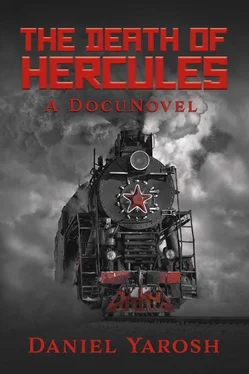“Good Shabbos ,” he smiled grimly. They returned the greeting.
“I sent the drinks over. Did they arrive?” Zalmund immediately asked Altmann.
“Yes, just a moment ago,” he replied.
They entered the first room on the floor, arranged now as a reception room. It was decorated in the German style, with light colored wood paneling, an elaborate cloth couch with side tables and lace doilies. On one side, a table had been brought in loaded with simple treats. Baked potato, shredded cabbage, herring, black bread, kasha varnishkes, and the very expensive delicacies of eggs (of course), cheese and butter. Across the room was another table laden with large clear bottles of vodka, and short, round flasks of dark red wine. Perhaps a dozen well-dressed young men stood at the back of the room, nervously shifting from one foot to the other. A few smoked Zodiak cigarettes and blew the smoke from the side of their mouths while they eyed Zalmund and his companions.
An older man, clean shaven and wearing an expensive suit, rushed into the room. He approached Zalmund with his hand outstretched. “I am Jacob Vogelman, Rabbi Hofitz. My daughter is Dinah. Her brothers are here,” and he gestured to the young men smoking.
“ Shalom , Herr Vogelman. I am sorry to meet under such conditions,” Zalmund said.
“It is so strange. My wife is sick with anxiety and I am at wits’ end. We can’t bring sense to these people. We are so grateful that you will intervene for us. We have nowhere else to go. Thank you.”
“Hold your thanks until the end of the evening,” cautioned Zalmund. “I’ll do my best.” Turning to all the men, he said “you understand, no matter what I say, you agree. You drink your wine to whatever I toast, anything. No vodka, it is treif . After a few introductory toasts, I will take the father…”
“Hamor” Jacob filled in.
“Hamor,” Zalmund continued “into the back room to talk. We will find a solution.”
One of the young men began to object, but Jacob hushed him with a cutting glare, and he relented.
“Forgive my son, he is worried for his sister,” Jacob said.
“I understand,” Zalmund replied.
They heard a group of men approaching the door, and a loud knock. The Altmann maid opened the door, and in marched a group of men, young and old, in military costumes from before the Great War. Among them were bright red tunics, khaki riding pants, polished boots nearly to the knee, and several wore daggers in scabbards tucked into their black leather belts. Their leader at the front had a wide, white mustache turned to a point at each end, a pointed white goatee and a peaked military hat with a visor which he removed and clutched under his arm.
“I am Major General Hamor Hivitsky,” he said, although he was not in any country’s army at that moment.
Altmann stepped forward and introduced himself. “Our honor to receive you. So good of you to come.” The words choked him. The two groups of young men stood across the room from each other, glaring.
“Come, come, gentlemen. I am Rabbi Zalmund Hofitz from Poznan” and Zalmund waived them into the room where they could see the food and drinks laid out before them.
“I am glad to see you receive us in this way,” Hivitsky said as he scanned the tables. “It is a good way to begin. But before we start with the celebration, we should discuss the arrangements…”
Before he could finish, Zalmund interrupted. “Good, good. Let us go into the next room, General Hivitsky, and discuss the arrangement.”
But the General looked at him quizzically. “We are all family now. We should discuss the plans with the whole family. We can talk with my people here.” He spread his arms to emphasize his inclusion, and to display his sword tucked in his belt.
“Yes, General, if we must,” Zalmund began slowly. “Perhaps there has been a misunderstanding.”
“Really?” Hivitsky said. “The young people love each other. It’s a modern world and we should adjust our thinking.”
“It takes more than that,” Zalmund said in a slow, low voice, trying to keep the conversation with just the General. “Perhaps we can make an offering and go back to the way it was. Some money.”
Hivitsky became agitated. He pointed his finger at Zalmund’s face. “You Jews, always the money first.” He turned to point at Vogelman. “You want to buy and sell your daughter, like a cow?”
Zalmund closed his eyes and felt himself enter the flow. He brought back Hivitsky’s attention with a low and calm voice. “That is just it. We want peace. No bad feelings, no broken promises. If money will help, let Herr Vogelman know what it is you want.”
Hivitsky met Zalmund’s gaze. “It’s too late for that.” Turning his head over his shoulder to his men he said loudly “They are practically married already!” His men smirked and snickered. One of Vogelman’s sons started forward, then was restrained by his father. Hivitsky’s men stood square with hands on their weapons.
The General turned back to Zalmund and Vogelman. “We can discuss the marriage dowry. We will manage the Reichmann egg business here and to the East. My son Szechem will be in charge and Herr Altmann will find work for my nephews. We will be a happy family in business together.”
Zalmund clenched his teeth, then relaxed and blinked. He said in a quiet voice, “You want the egg business?” He nodded slowly. “Why don’t you just take it? Why do you need this man’s daughter?”
Hivitsky relaxed and nodded. At last, they were talking business. “We could take it, yes, if we wanted. If we took it, as you say Rabbi, we would just be another small competitor to Reichmann. With his family, this man’s daughter and her children, we are partners. What’s good for us is good for Reichmann. This is the way it has been done here for generations, before you came, Rabbi.”
“Not in this way,” Zalmund began but Hivitsky interrupted.
“Are you sure? Anyway, that is the way it is now. You know our terms, and we are agreed, are we not?” He turned to Vogelman. “The priest will start the Mass at noon. The wedding sacrament will start shortly after.” Turning to Zalmund he said, “You will be the Rabbi for them?”
Vogelman burst in from out of a daze. “What? No! No rabbi will marry a Jew to a Catholic. It cannot be!” The situation was out of control and Zalmund was doing nothing to stop it.
Hivitsky spoke calmly to them both but with teeth clenched and a determined brow. “It must be so, in order that you Jews recognize the new family. Hofitz,” he said in a derisive command, “you will be the rabbi. Then we are all agreed.”
There was a long pause, as Vogelman, Altmann and Zalmund looked at each other. Did someone have a plan to save Dinah? What more could be said? Please, God, something. Max and Deena approach Zalmund, but he slowly closed his eyes, and cleared his throat in a way that sounded like a prayer. He turned to Hivitsky and opened them.
“Agreed,” he said.
Vogelman collapsed on the sofa, his head in his hands. His sons rushed to him and glared at the Polish men in uniforms.
“Excellent!” the General declared. “Now we must toast the new couple!”
“Yes, but first,” Zalmund said in a loud voice, “according to the traditions of our people, we must say our blessing over the wine.” Glasses were filled with wine and passed to all.
“ Baruch atah Adonai, eloheinu Melech ha’ olam, borei pri hagafen ,” Zalmund intoned with eyes closed. He raised his glass high and drank the wine. The Poles drank in relief that this near violence had passed. The Jews swallowed their bile. The wine was sickly sweet and left a tart and cloying aftertaste. Several of the Polish men gagged and spit the wine back in their glasses. The Jews sipped and cringed, the sweet wine bitter in their mouths.
Читать дальше












